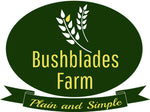Animal Welfare
Animal welfare at Bushblades Farm is underpinned by the UK Farm Animal Welfare Councils “Five Freedoms” which outline five aspects of animal welfare under human control and has been adopted by professional groups including the RSPCA. At Bushblades Farm the five freedoms are at the forefront of all farming operations in order to ensure the highest animal welfare standards are achieved and maintained.
-
Freedom from Thirst and Hunger - to have ready access to fresh water and a diet to maintain full health and vigour =
- All enclosures are equipped with automated feeding and watering stations and are visited at least twice a day as part of the welfare check and feeding routine
- All enclosures are equipped with automated feeding and watering stations and are visited at least twice a day as part of the welfare check and feeding routine
-
Freedom from Discomfort - to provide an appropriate environment, including shelter and a comfortable resting area =
- All enclosures are equipped with suitable accommodation to provide both shade and shelter from adverse weather.
- Stocking rates are maintained at a level to ensure animals are able to find solitary space if required
-
Freedom from Pain, Injury and Disease - to ensure prevention or rapid diagnosis and treatment =
- Controls are in place to ensure a suitable living environment for each animal species
- Other than home grown produce, accredited feed supplies are sourced to ensure a safe, balanced and healthy diet is provided for each animal species
- A wholesome water supply is provided to each enclosure, sufficient for maximum stocking levels, and the natural water supply is subjected to routine chemical checks to ensure it remains wholesome
- Welfare checks are performed at least twice a day to ensure rapid identification of issues
- Any signs of pain, injury and disease are investigated and addressed immediately. Medical intervention is via our registered vet, as necessary
-
Freedom to express (most) normal behaviours - to provide sufficient space, proper facilities and company of the animal's own kind =
- Enclosures are more than sufficient size to accommodate stocking rates and maintain soil conditions to meet our regenerative requirements
- Each enclosure is set within the boundaries of Bushbaldes Farm providing a safe and secure natural environment for expression of natural behaviours such as rooting and wallowing. Trees or screens provide shade in sunning conditions.
- No animal will be subjected to solitary confinement unless instructed by our Vet for medical purposes
-
Freedom from Fear and Distress - Ensure conditions and treatment to avoid mental suffering =
- Enclosures are secure and animals are separated by age, size and species to avoid aggressive behaviour and allow for happy feeding regimes
- Welfare checks are performed at least twice a day to assess environmental conditions
- All staff who carry out welfare checks or handle animals on site are suitably trained and are aware of our species traits and specific needs

We rear all of our rare breed pigs outdoors where they are free to range across the grassland fields in small family groups. This means our pigs live happier lives in a more natural and traditional manner than intensively farmed pigs. They are fed a natural diet which is free from additives and genetically modified feed.

Buying cheap pork from factory farms carries hidden costs that many people are unaware of:
- The globalisation of our livestock system undermines our local small scale, high welfare pig farmers and results in the loss of food sovereignty.
- Animals are abused through confinement, overcrowding, illegal tail docking, illegal lack of bedding, neglect and denial of natural behaviours.
- Public health is threatened through antibiotic overuse which leads to antibiotic-resistant diseases that can pass from pigs to humans.
- Factory pig farms produce waste that pollutes the air, sickening local residents, and contaminates rivers, lakes and the sea, causing fish kills and destruction of aquatic wildlife.
- Rainforest and Cerrado habitats in S.America are destroyed in order to grow genetically modified soya for pig feed – which is then shipped 8,000 miles to factory farms in Europe.
For further information on how to identify high welfare pork click here




